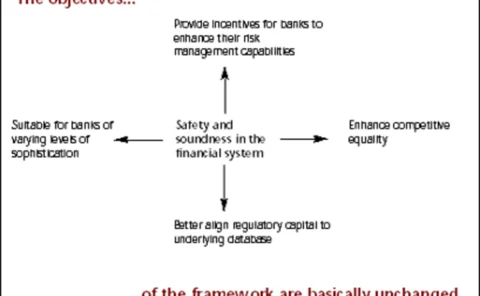Credit risk
A new twist to ABS
Synthetic securitisation
Review of the year
A look back at the significant risk events of 2001.
Enron collapse a test, not threat, to credit market
Enron’s bankruptcy may be the biggest test of the credit derivatives market to date. But when the dust settles, its most profound effect may be on credit investors’ preference for managed portfolio transactions. Rob Dwyer reports
Building for Basel
The 2005 implementation date for the new Basel II Accord – already postponed by a year – is looming large. Whilst the banking sector is steadily gearing up for the proposed changes, there are fears that some institutions may be left behind.
Building for Basel
The 2005 implementation date for the new Basel II Accord – already postponed by a year – is looming large. Whilst the banking sector is steadily gearing up for the proposed changes, there are fears that some institutions may be left behind.
A spanner in the works
The US and Germany are in a standoff over Basel II’s capital charge calculation for SME lending. Without a compromise this month, the issue threatens to derail implementation of the Accord and the European Directive.
Building for Basel
Basel implementation
ING Barings debuts with synthetic CDO in Asia
ING Barings, the investment banking arm of Dutch bancassurer ING, has arranged what it claims to be the first arbitrage synthetic collateralised debt obligation (CDO) transaction managed by a portfolio manager in Asia, in an attempt to cater to the…
S&P offers CDO manager ratings on the Web
International debt rating agency Standard & Poor’s (S&P) has begun offering evaluations of collateralised debt obligations(CDOs) managers for free on its website. While the move appears timely given the current turbulent environment for non-investment…
Banking on progress
A dizzying array of credit risk technology firms have set up shop in Asia in order to reap the rewards of the new Basel recommendations. But are Asia’s regional banks ready to implement these systems?
Basel inflicts collateral damage
The current Basel proposals could lead to the global spread of the type of systemic loan loss problems Japan is now experiencing, argues John Frye of the Federal Reserve Bank of Chicago.
Pro-cyclicality in the new Basel Accord
Could Basel II worsen recessions? By backtesting the proposed capital rules to the last recession, D. Wilson Ervin and Tom Wilde argue that the increased risk sensitivity of loan portfolio regulatory capital in the new Accord could have unwelcome…
A healthy exposure
Credit derivatives
Banking on progress
Technology
Basel scraps 'w' charge from pillar 1
The Basel Committee on Banking Supervision has reacted to strong industry criticism of its controversial 'w' charge by scrapping it from pillar 1, regulatory capital, of its proposed new regulatory capital requirements – Basel II. It will now be included…
Probing granularity
The granularity adjustment, which adjusts risk weightings for credit portfolio diversification, is one of Basel II’s key modelling assumptions. Here, Tom Wilde uncovers a weakness in this assumption arising from the differences in the underlying credit…
Basel bonds Canada
The largest Canadian banks have banded together to share default data, making it much more likely they will all qualify for the most advantageous regulatory capital approach under the Basel II capital Accord.
Why Basel must brush-up on credit
Paul Kupiec of the International Monetary Fund argues that unresolved calibration problems remain with the new Basel Accord’s credit risk capital requirements – problems that may lead banks to make damaging risk decisions.
Weighting for Risk
Basel has recognised that collateral and seniority give banks an advantage when an obligor defaults. Here, Jon Frye argues that the proposal may encourage banks to lend on the collateral – a practice that could threaten their own survival – and proposes…
Basel's new credit model
The Basel Committee’s new consultative paper allows banks to internally rate individual credits. But at the portfolio level, Basel wants to apply a single model framework, based in part on a technical paper published in Risk magazine in October 1998.
Documentation dilemmas
Concerns over credit event definitions and the Basel Committee’s ‘ w ’ capital charge on credit mitigation instruments will not be easily resolved.
Basel part one: the new accord
The Basel Committee’s second consultative paper on reform of the 1988 Accord on capital holds some surprises. Some believe regulatory capital will now have to rise. Dwight Cass reviews the changes.






